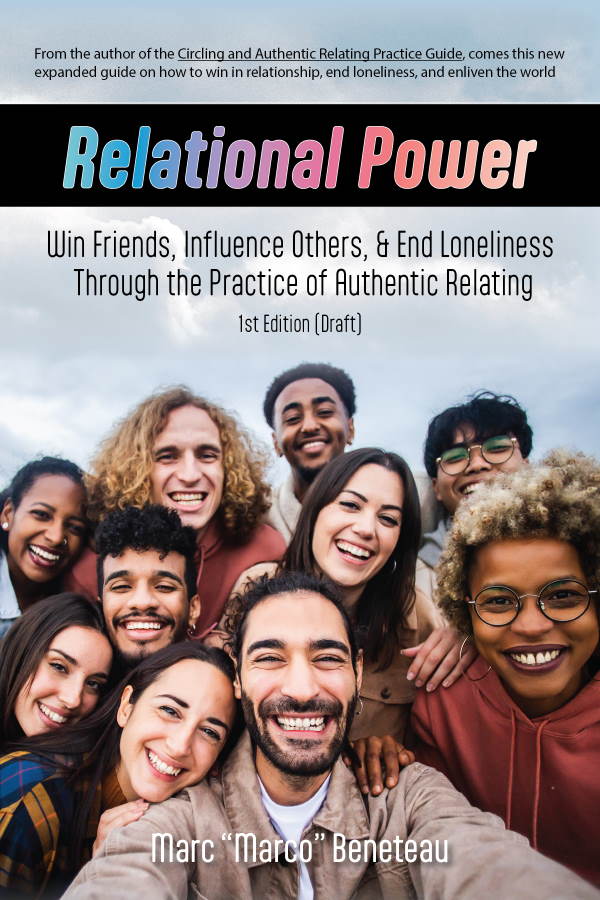Update Dec/2022: there is now a whole chapter in Relational Power about this, NVC and Circling: How they complement each other; Learning the language of feelings and needs
(Extract from the Circling Guide)
NVC is a large and very popular movement, much better known than Circling and also (unlike Circling) with a lot of printed training resources, including Marshall Rosenberg’s book Nonviolent Communication: A Language of Life, which has been translated into over 30 languages. NVC is also much older than Circling, since Marshall started his work in the 1960s, almost 40 years before Circling started. Marshall died in 2015, but his work continues in at least 60 countries, including many developing countries where circling has very little penetration, if at all. NVC is a fantastic resource for anyone interested in A/R and social change. In many ways, NVC is the “original” Authentic Relating model.
Circling and NVC practice groups are not vastly different. Both focus on empathy and connection. The place where Circling goes beyond NVC (and hence Circling is considered by some as “next generation NVC”), is in the use of impact statements and reflections, with (perhaps) a greater focus on the relational space and less focus on “techniques”. The upside of Circling over NVC, is that circling can be, potentially, more exciting, deeper, and faster-paced; while the downside is that circling can devolve into a shit-storm, whereas in NVC there are “rules” and guidelines relating to responsible communication of our feelings. The idea of responsible communication, also known as “owning your experience”, is a key part of Circling but it cannot always be presented or taught, especially in beginner groups.
Understanding Marshall Rosenberg’s work, and particularly around the central function of feelings and needs, is key to effective communication, and hence to Circling skillfully. At core, NVC provides a framework and communication model for evoking, expressing and fulfilling human needs, and particularly needs for closeness, trust, authenticity and vulnerability.
The concept of “needs” is central to NVC. In NVC, any expression of need (provided it does not come with an unspoken judgment or demand) is considered a gift, as it gives another person an opportunity to contribute to you and hence make life more wonderful for both of you. (The idea of “making life more wonderful” is also core to NVC: our central desire, according to Marshall, being to “contribute to life”).
As you become more skillful in NVC, you acquire the ability to listen for and reply empathically to the feelings and needs that underlie all human communications – even those communications that are initially expressed as judgments and demands. It is a powerful skill that can enable you to navigate successfully even the most emotionally charged and confrontational of human interactions.
The NVC concept of “needs as a gift” is revolutionary, because it is a direct contradiction to Western cultural conditioning. Most of us learn as children that needs are bad. “Needs” make us dependent on other people, vulnerable, “needy”, shameful. Much better, our culture tells us, to ride solo into the sunset, masters of our own destiny, alone and above the crowd and on top of every situation. This may have been a good idea at one time, but it doesn’t work anymore, not even for doing business, let alone in interpersonal relationships. In the complex and inter-related world that we live in, our true strength and power lies through connection and vulnerability. This has been confirmed in work-place studies by Google.
As such, NVC might be considered a precursor of Circling as it shares many of the same values and beliefs. NVC is an art form, like Circling and meditation, in which you can spend an entire life deepening your practice.\
Authentic Relating, Negative Feedback, and an NVC Primer
(Extract from the Circling Guide)
When practicing Authentic Relating, such as in every-day conflict situations with people in your life, you have to be even more careful, more discerning and more disciplined about giving negative feedback.
The reason for that has already been stated: you can’t assume a person in your life who hasn’t circled, such as a house-mate or business associate, is going to have skill and commitment to explore the space of connection with you. It is possible that they are angry and blameful towards you and have little interest in investigating the connection space between the two of you, which may be non-existent from their perspective. It’s possible they just want you to change or adapt to them in order to ease their own suffering, and they may not be very receptive to your telling them that their suffering is not your problem, and that they need to take greater ownership of their feelings and communicate more responsibly if they want to be heard by you – even though all this may be “true”.
The Non-Violent Communication (NVC) model can be very helpful in cases such as this. There is a considerable overlap between Circling and NVC, with the difference that NVC does not assume or ask the other person for a commitment to connection. NVC simply assumes that the other person has “needs” – for understanding, affection, belonging, acknowledgement etc. – and then tailoring your attitude and language towards meeting those needs in them (which, hopefully, will calm them down and make them more receptive to you). As such, NVC might be more attuned to the Authentic Relating practice.
Let me give an example. Your housemate has been leaving dirty dishes and you feel a sense of outrage. After some introspection you track it down to this belief: “Caring and responsible people don’t leave dirty dishes. My housemate is demonstrating that he is irresponsible and doesn’t care for me”. Before you approach your housemate, you would be wise to consider: Is this belief really true? Have you yourself ever left dirty dishes for your mother to clean up? Are you justifying your anger towards your housemate by imagining that you are right, that there is a right way to behave, and that you have something to teach them about what’s right? What are the feelings and needs that might be alive in your housemate? Is it possible they are just overwhelmed and unhappy with their life, and doing their own dishes is difficult for them and has really nothing to do with you? This is the kind of self-inquiry that we ought to consider prior to engaging another person in negative feedback. Even in cases where you feel completely justified and are dealing with a minimum acceptable behavior that you need to be respected, you would still be wise to approach the other person with curiosity about them, and try to express care rather than your unspoken (covert), or even overt make-wrongs – if you want to be heard, that is.
Sharing negative feelings with other people can be difficult under the best of circumstances. A “pure” Circling approach would be to share vulnerability, admit that you are upset and that you may not even know why: “As I hear you speak and express your anger, I feel strong resistance to you and also feel totally unseen and disconnected from you, and it is very painful for me”. But this is probably not a formula that you would want to try with your non-circler housemate who is attacking you for failing to do the dishes. In general, it is always tricky to challenge someone to some way of being that is different than how they are currently showing up (maybe fuller or more true, or more loving, at least from your perspective). This is a complex topic. We will return to it in the “Communicate Responsibly” section.


